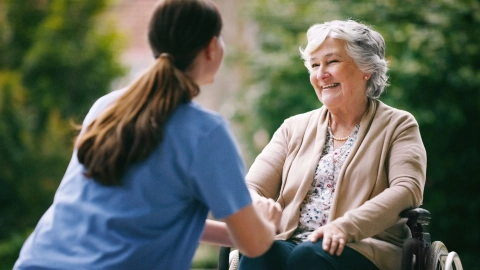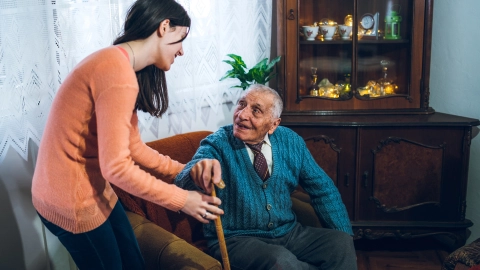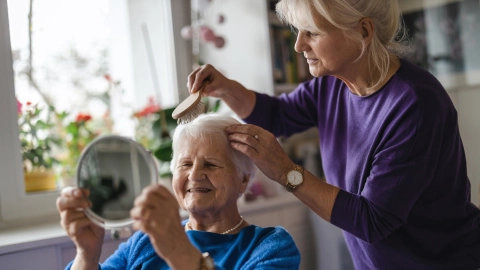Care Relief and support for family carers in older age
Many older people provide care to their loved ones – sometimes until they themselves are of considerably advanced age. They are often the sole carer, despite having their own health problems. Care advice and benefits offered by health insurance and long-term care insurance provide them with support and relief.
At a glance
- Most older family carers care for a spouse or life partner.
- Many of them feel that their caring role has an impact on their own health. Caring for a family member with dementia is particularly challenging.
- Health promotion and support and respite services are particularly important for older people acting as carers.
- Health insurance benefit and long-term care insurance entitlements can benefit both the person in need of care and their carer.
- Health insurance covers the cost of certain health services for caregivers.
- Care and respite services for those in need of care give family carers an opportunity to look after their own health.

What are the challenges facing older carers?
There are no age limits to caring for a loved one – family carers are often of retirement age themselves and, in some cases, continue to act as carers until they are of considerably advanced age. Many carers are aged 80 years and older.
Older family carers generally care for their spouse or life partner. Compared with carers who have not yet retired from working life, they invest more time in their role and more frequently take on responsibility for care tasks proper, such as assistance with personal hygiene.
Older carers often reach their physical limits when fulfilling their caring role. Carers who have already reached retirement age have more time than carers who are still working. However, they face a different set of challenges:
- Many report that caring for their partner is too challenging for them. They find certain care tasks particularly difficult.
- Many feel trapped in their role as carers. Their contact with friends is significantly limited.
- Caring for a partner with dementia is particularly draining. The loss of their relationship as it was and the need to be always available to provide care are very difficult for them to bear.
- Many rate their own state of health as not good.
Constant strain can lead to health issues, such as depression, back problems and cardiovascular diseases in carers. They also have to deal with the decline in health, strength and energy that comes with age. Older carers therefore need a significant degree of health promotion, respite and support.
Why is respite so important for older family carers?
Many older carers are solely responsible for caring for their partner or at least carry the main burden. There are many reasons for this. Some people manage without help because the person in need of care does not want to be cared for by strangers. Or the carer may feel that the task of caring for their partner naturally falls to them and may not think to ask for help. Many older people also find it difficult to hand over responsibility and don’t want to be a burden on others. Some fail to ask for help out of a sense of shame.
However, freedom, diversion and taking time to stop and take a deep breath are important for mental and physical health. And this, in turn, is important in order to be able to deal with demanding situations.
Long-term care insurance offers various options that allow carers to take some time for themselves on a regular basis while their partner in need of care is still looked after. Nursing care specialists or other trusted individuals may also take over their role on a temporary basis.
Professional carers
The strain on the carer and on their relationship with their partner can be relieved if certain tasks are taken over by professional care services. These include, for example, strenuous physical tasks such as moving the person from the bed to the shower or bath, personal care tasks of an intimate nature and assistance with personal hygiene, as well as any other care tasks that may give rise to conflict between the carer and their partner.
Non-cash care benefits can be used for this purpose. It is also possible to avail of these benefits in combination with the care allowance.
Part-time care
Partial residential care allows people in need of care to spend part of each day in a care facility, where they are cared for by professional nursing and care staff. They return home for the remainder of the day and overnight.
The respite care allowance and the additional relief allowance can also be used to finance part-time care during the day.
Contact with other people can also benefit the mental health of the person in need of care. This can be facilitated by attending group day care facilities, meeting people in a similar situation in a self-help group or having visits from volunteers.
When is it useful to seek advice on care?
Caring for people who have been assigned a care grade can be very challenging, especially in the case of those with higher care grades or conditions that are associated with significant impairments. Long-term care insurance offers free advice and training to equip family carers for the task.
Many people don’t seek advice. For example, they may view doing so as a loss of independence or as a sign of weakness. However, well-organized care, where the needs of the person in care and the caregiver are taken into consideration, can help to maintain a stable care arrangement and, in certain circumstances, delay or avoid a move to nursing home care.
Sometimes, the need for care arises suddenly, for example, after a stroke. More commonly, it is a long process of the carer providing increasing levels of support on a daily basis and attending to more and more care needs. Seeking advice at an early stage can therefore be beneficial. Care advisors also provide information about special supports available to older family carers.
What advice options are available?
Various advice options are available. For example, advice is available on organizing care at home, care benefits, specific issues such as caring for people with dementia, stroke, medical aids or how to set up an accessible living space. Advisory centers are usually also happy to help with applications. People can avail of many of these advice options from home, online or by phone.
You can find care advice centers near you in the Center for Quality in Care (Zentrum für Qualität in der Pflege, ZQP) database.
What care courses are available?
Health insurance providers, as well as some social associations, self-help organizations and adult education centers offer a wide range of care-related courses, for example, covering tips and techniques for providing relief to carers and ensuring adequate care, as well as individual health conditions and what these mean in terms of care needs. Options for discussing care-related problems with other people in similar situations are also offered. Many care courses can be completed at home or online if necessary.
Why is health promotion important for older family carers?
Older carers often have health issues of their own. It is particularly important for them to take care of their own health and well-being so that their caring role doesn’t cause them to become ill. Health and long-term care insurance offers various benefits for this purpose.
Mental health
Treatment may be necessary if the carer is experiencing mental health problems, such as constant tiredness or signs of depression or if they are experiencing relationship difficulties or disrupted sleep. Family doctors are the first point of contact in this case and they can help the carer decide if therapy may be beneficial.
Contact with friends or other carers can provide relief and be beneficial for mental health. There are also self-help groups where family carers can talk about their experiences and exchange helpful tips.
Therapy may also be beneficial for carers if they are showing signs of depression or are struggling with their health. This can, in turn, ease the care situation at home. Doctors can provide advice on whether this is an option worth considering.
Physical health
Caring for an adult can be physically very demanding, for example, if the carer needs to provide assistance with sitting up and changing position. Mental health problems can also have an effect on the body, for example, they can cause back problems. The immune system can be weakened, increasing the risk of infection.
It is important to consult a doctor without delay when any health issues occur. The costs of treatment, medication and therapeutic services such as physiotherapy are covered by health insurance providers.
Therapeutic services must be prescribed by a doctor. Those with health insurance are entitled to these services provided that they are medically necessary.
If you experience any problems in relation to prescriptions for therapeutic services, you can contact the Independent Patient Advice Service for Germany (Unabhängige Patientenberatung Deutschland, UPD).
Interesting fact: Exercise is important for both physical and mental health. Exercise includes everyday activities such as walking instead of taking the car and using the stairs instead of the elevator. There are also sports activities specifically organized for older people, for example, in sports clubs or via health insurance funds.
Exercise is also important for people in need of care. In some cases, carers and the partners they care for can enjoy sports and activities together. Getting adequate exercise can also be beneficial for people with dementia who experience unrest or wander at night.
A sports program for older people is offered by the Federal Center for Health Education (Bundeszentrale für gesundheitliche Aufklärung, BZgA).
For tips on how exercise can protect the health of carers and those they care for, see the Center for Quality in Care (Zentrum für Qualität in der Pflege, ZQP).
Intensive treatment may be required if the carer’s health problems are severe. A prescribed visit to a health resort is intended to help people avoid health problems. Meanwhile, rehabilitation is intended to improve health issues or provide people with the knowledge they need to cope better. Both health resorts and rehabilitation facilities can be attended on an inpatient or outpatient basis.
Family carers can choose for themselves whether an inpatient or outpatient option suits them best. With inpatient rehab, carers are entitled to have the person they care for looked after in the same facility where they are staying.
For more information, see the article about medical rehabilitation.
The German Alzheimer’s Society (Deutsche Alzheimer Gesellschaft, DAlzG) provides information about rehab for family carers.
Who will be responsible for care when I’m not there?
Carers often don’t have enough time to pursue sports and take care of their own health. Care benefits can be used to finance hourly care and respite care:
- Respite care allowance: Care can be provided by care services or by people from the person’s circle of friends and neighbors.
- The additional relief allowance can be used to finance help with care and home help.
Volunteer visiting or chaperoning services operate in many parts of the country. These can also be used by people without an assigned care grade who require hourly care.
More information about voluntary services is available from the “Aging at home” (“Zuhause im Alter”) service provided by the Federal Ministry of Family Affairs (Bundesfamilienministerium).
If attending an inpatient health resort or rehab facility, carers can apply for short-term care to ensure continued care for their partner. In certain cases, short-term care can be provided in the same facility where they are staying.
The respite care allowance covers the cost of care at home while the carer is away.
How can medical aids support care at home?
It is important to encourage the person in need of care to do as much as possible for themselves. This exercises and maintains their physical abilities. It also takes some of the burden off the carer.
A range of medical aids is available to support people in need of care with tasks that they are unable to complete (entirely) on their own, for example:
- reacher grabbers to avoid exertion or hooks to help with buttons on clothing
- grab rails and toilet attachments to enable independent personal hygiene and toilet use
- digital aids, such as medication dispensers with reminder functions
- technical aids, such as care beds and transfer aids for repositioning and sitting up
For more information about medical aids, see the articles about accessible living and medical aids.
Additional information about applying for medical aids and care aids is available from consumer advice centers.
What is a flexible pension?
Carers can use the work they do as carers to increase their pension – even if they are already drawing a state retirement pension (“Altersrente”). The care recipient’s long-term health insurance fund pays pension insurance contributions for the carer.
The following prerequisites apply:
- The carer must spend at least 10 hours per day on 2 or more days per week caring for and supporting the care recipient.
- The care recipient must be assigned a care grade of 2 or higher.
- The carer must be providing unpaid care at home.
As part of the care assessment, the Medical Review Board checks whether these prerequisites are fulfilled and documents this in their care assessment report. The family carer is then registered with the long-term care insurance fund as the care recipient’s carer.
Generally speaking, anyone who is drawing an early retirement pension and is registered as a carer automatically receives higher pension contributions. However, it may be useful to ask the care recipient’s long-term care insurance fund about this matter.
Carers in receipt of the regular state retirement pension must first apply to the pension insurance fund for a partial pension and will temporarily have to go without part of the pension. The care recipient’s long-term care insurance fund must then be informed that the pension is being drawn. The pension then increases as of July 1 the following year.
More information about flexible pensions is available from consumer advice centers.
- BAGSO – Bundesarbeitsgemeinschaft der Seniorenorganisationen e.V. Entlastung für die Seele. Ein Ratgeber für pflegende Angehörige. 10. aktualisierte Auflage 2022.
- Deutsche Gesellschaft für Allgemeinmedizin und Familienmedizin e.V. (DEGAM). Pflegende Angehörige von Erwachsenen. S3-Leitlinie. AWMF-Register-Nr. 053-006 DEGAM-Leitlinie Nr. 6. 2018.
- Sonja Nowossadeck, Heribert Engstler & Daniela Klaus (2016). Pflege und Unterstützung durch Angehörige. Report Altersdaten 01/2016. Deutsches Zentrum für Altersfragen: Berlin.
- Verbraucherzentrale. Flexirente: So bessern pflegende Rentner ihre Rente auf. Aufgerufen am 15.05.2023.
- Zentrum für Qualität in der Pflege (ZQP). Prävention von Gesundheitsproblemen mit einem Fokus auf häuslicher Pflege – 2018. Stand: Januar 2018.
- Zentrum für Qualität in der Pflege (ZQP). Prävention in der Pflege. Aufgerufen am 21.03.2023.






